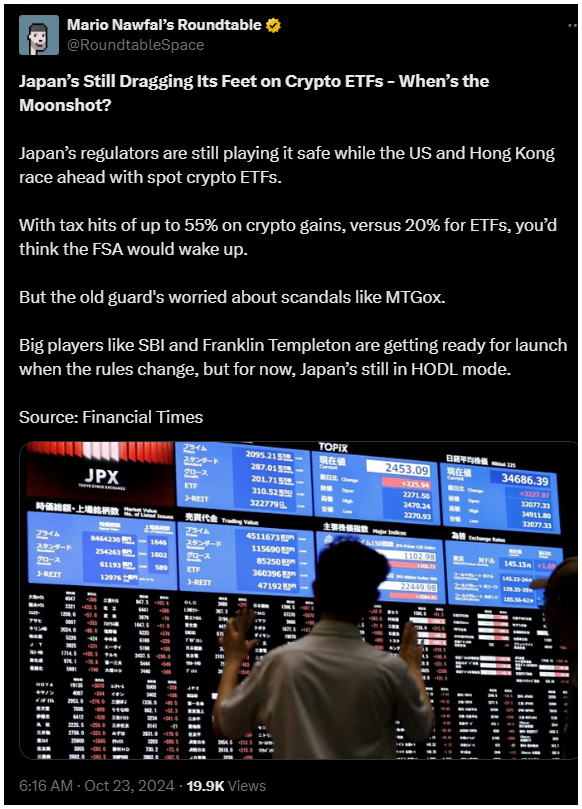Japan is taking its time when it comes to approving crypto-based ETFs, and its strict tax policies and cautious regulations are making it even harder for the country to step into this financial trend.
Global market changes, Japan stucked in the past?
While other countries are jumping into the world of crypto ETFs, Japan’s regulators are still holding back.
Despite increasing pressure from local advocacy groups and new partnerships aiming to launch digital asset products, Japan’s tax and regulatory environment continues to pose quite challenges for the indutry participants.
Entrepreneur Mario Nawfal described Japan’s stance as being “still in HODL mode,” which means they’re holding back instead of moving forward.

In contrast, places like the United States and Hong Kong have already approved spot Bitcoin and Ether ETFs, showing a growing interest in blending crypto markets with traditional finance, and this shift is pretty clear as both institutional and retail investors are diving into new crypto ETF products.
For example, on October 22 alone, investors put $329 million into BlackRock’s iShares Bitcoin Trust.
The U.S. SEC gave the green light to spot Bitcoin ETFs in January and followed up with Ether ETFs in July.
Hong Kong authorities approved both types of ETFs back in April. Yet, Japan’s Ministry of Finance and its Financial Services Agency remain cautious about the risks and volatility that come with crypto ETFs.
Regulatory issues
A big part of Japan’s hesitation comes from its tax policies. Profits from general crypto investments are taxed as miscellaneous income at rates that can reach up to 55%, what is crazy high, we can say that.
In comparison, traditional ETFs enjoy a much lower capital gains tax rate of around 20%. This difference has raised eyebrows among many in the investment sector. Understandably.
Yuichiro Tamaki, the leader of Japan’s Democratic Party for the People suggested that voters should support his party if they believe crypto assets should be taxed separately at 20%.
He also argued that there should be no tax when exchanging crypto assets with other crypto assets, stating that his party wants to make Japan a strong player in the Web3 space. Yet, Tamaki’s party holds relatively few seats in Japan’s parliament.
Nothing stops this Bitcoin train?
Despite these regulatory hurdles and tax concerns, Japanese companies are still keen on accumulating crypto assets.
For example, Metaplanet, an investment firm based in Tokyo, bought another 108.78 BTC worth about $6.92 million in early October.
This brings their total holdings to nearly 640 BTC. Known as “Asia’s MicroStrategy,” Metaplanet has been actively acquiring Bitcoin and recently reported holding 639.5 BTC valued at around $40.5 million.


